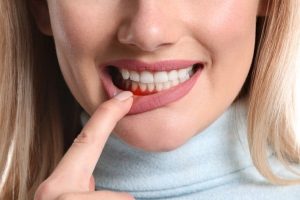What You Should Know About Gum Disease from Our Long Island Dentists
Did you know that almost half of all adults over the age of 30 have some form of gum disease? Fortunately, at our Long Island dental practice, our team of dental professionals is dedicated to helping patients achieve healthy gums and maintain optimal oral health. From laser treatments to pinhole surgical treatments, our periodontists offer numerous periodontal disease treatments to ensure you get your health back on track.
If you’re suffering from gum disease, contact our dental team today! With dental office locations in Medford and Hauppauge, we’re here when you need it. Dr. Farber, an experienced Long Island periodontist, has helped countless patients restore their oral health.
What Is Gum Disease?
Gum disease, also known as periodontal disease, is an infection of the gums that gradually destroys the support of your natural teeth. Periodontal disease affects one or more of the periodontal tissues (the tissues around your teeth): alveolar bone, periodontal ligament, cementum, or gingiva (gum tissue).
It’s caused by bacterial buildup and plaque on the teeth, which can lead to inflammation, swelling, and infection. If left untreated, gum disease can cause damage to the teeth and gums, leading to tooth loss and other health complications.
Periodontal disease progresses through the following factors:
- Poor oral hygiene
- Smoking
- Genetic predisposition
- Hormonal changes
- Certain medications
- Systemic diseases like diabetes
The Stages of Gum Disease
Gingivitis
Gingivitis is the earliest stage of gum disease and is characterized by inflammation and swelling of the gums. The primary cause of gingivitis is excess plaque, which is a sticky, colorless film that adheres to your teeth at and below the gum line. Gums may become inflamed, red, swollen, and bleed easily. If this irritation is prolonged, the gums separate from the teeth, causing pockets (spaces) to form.
Periodontitis
If gingivitis progresses into periodontitis, the supporting gum tissue and bone that hold teeth in place deteriorate. The progressive loss of this bone, the alveolar, can lead to loosening and subsequent loss of teeth. Periodontitis is caused by bacteria that adhere to the tooth’s surface, along with an overly aggressive immune response to these bacteria.
Periodontal Disease Symptoms
Symptoms of periodontal disease often include:
- Bleeding gums
- Red, tender, swollen gums
- Gums that have pulled away from your teeth, also known as gum recession
- Persistent bad breath or a bad taste in the mouth
- Pus between your teeth and gums
- Separating or loose teeth
- Changes to your bite
If you experience any of the symptoms mentioned above, contact Dr. Farber at our Medford and Hauppage dental offices today.
Treatments for Gum Disease at Farber Center for Periodontics and Dental Implants
Periodontal Gum Surgery
Pocket correction therapy (gum surgery) is used when your periodontal disease has advanced to the point where supportive tissue has been destroyed, and just eliminating bacteria without also using this procedure isn’t sufficient to prevent further disease progression. Our Long Island dentists may recommend pocket reduction surgery when you have advanced infections or pockets too deep to reach by scaling and root planing alone.
Laser Gum Surgery
Laser gum surgery refers to various dental procedures that use lasers to treat and modify gum tissue. The Farber Center provides the most advanced laser gum surgery Long Island has available. One of the most effective forms is LANAP (Laser-Assisted New Attachment Protocol). Laser treatments are minimally invasive procedures that remove infected tissue and promote quicker healing.
Pinhole Technique
The pinhole surgical technique is a minimally invasive gum recession treatment alternative to traditional gum grafting. The technique involves making a small hole (about the size of a pinhole) in the gum tissue above or below the teeth experiencing recession. Through this pinhole, special instruments are used to gently loosen and reposition the gum tissue over the areas where the gums have receded.
Gummy Smile Correction
Also known as crown lengthening, gummy smile correction is performed to improve the health of the gum tissue, prepare the mouth for a procedure, or correct a “gummy smile.” A “gummy smile” often describes an instance where teeth are covered with excess gum tissue, resulting in a less aesthetically pleasing smile.
Perioscopy
Perioscopy is an innovative dental procedure that uses advanced technology to treat periodontal disease. This minimally invasive technique utilizes a tiny digital camera attached to a dental endoscope, allowing our Long Island periodontists to see the area beneath the gum line in great detail. The high magnification and illumination give us the ability to diagnose and treat areas of infection that would otherwise be difficult or impossible to identify with the naked eye.
Gum Disease Risk Factors
To prevent gum disease, consider the following risk factors:
- Poor oral hygiene
- Tobacco use
- Age
- Genetics
- Poor nutrition
- Diabetes
- Hormonal changes
- Certain medications
To schedule an appointment at our Long Island dental practice, get in touch with our experienced dentists today. We can help treat gum disease and educate you on the best way to keep periodontal diseases at bay.
Frequently Asked Questions
Can gum disease be prevented?
Yes, gum disease can be prevented through good oral hygiene routines. By brushing twice a day, flossing, using fluoride toothpaste, and visiting the dentist twice a year for professional dental cleanings, you can prevent the onset of gum disease.
Is periodontal disease contagious?
Periodontal disease itself isn’t considered contagious in the same way as a cold or flu. However, the bacteria that cause gum disease can be transferred from one person to another through saliva. This means that activities involving the exchange of saliva, such as kissing, sharing utensils, or using the same toothbrush, could potentially spread the bacteria responsible for gum disease.
What can gum disease cause?
When gum disease is left untreated, it can cause:
- Receding gums
- Gum abscesses
- Loose teeth
- Bone loss
- Loss of teeth
What are the warning signs of gum disease?
Warning signs of gum disease often include:
- Swollen gums
- Bleeding gums
- Tender gums
- Bad breath that won’t go away
- Pus between your teeth and gums
- Bright red, dark red, or dark purple gums
Improve Your Periodontal Health at Farber Center for Periodontics and Dental Implants
Ready to improve your dental health and rid your mouth of gum disease and its symptoms? Contact our Long Island periodontists today for care you can rely on. For those in or around Medford, contact our dental office at 631-758-3700. For those in or around Hauppauge, call 631-265-4442.



